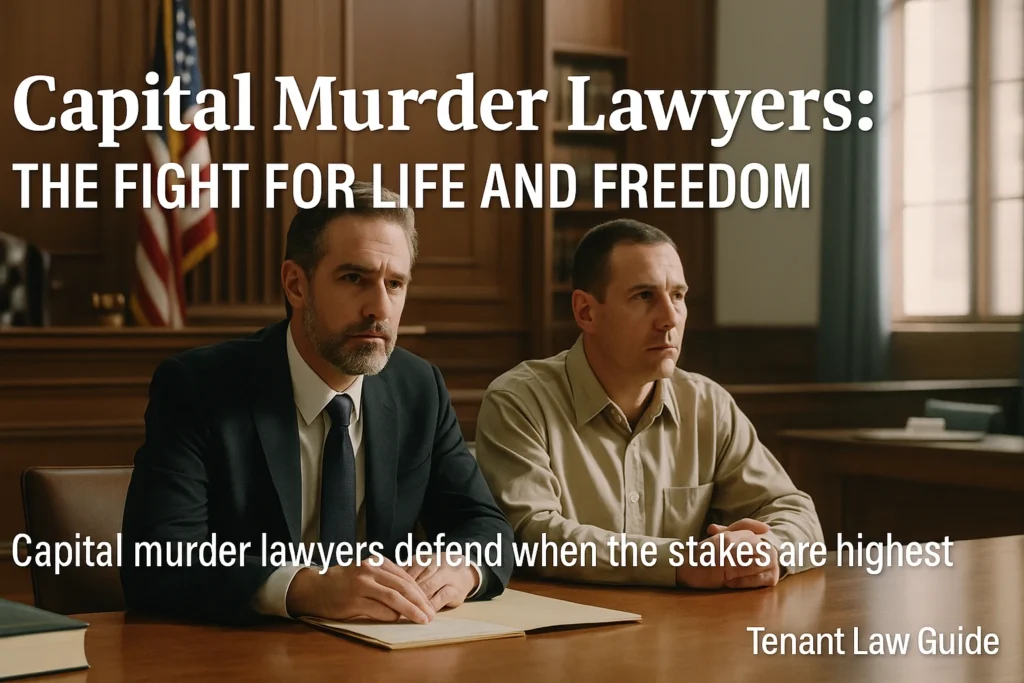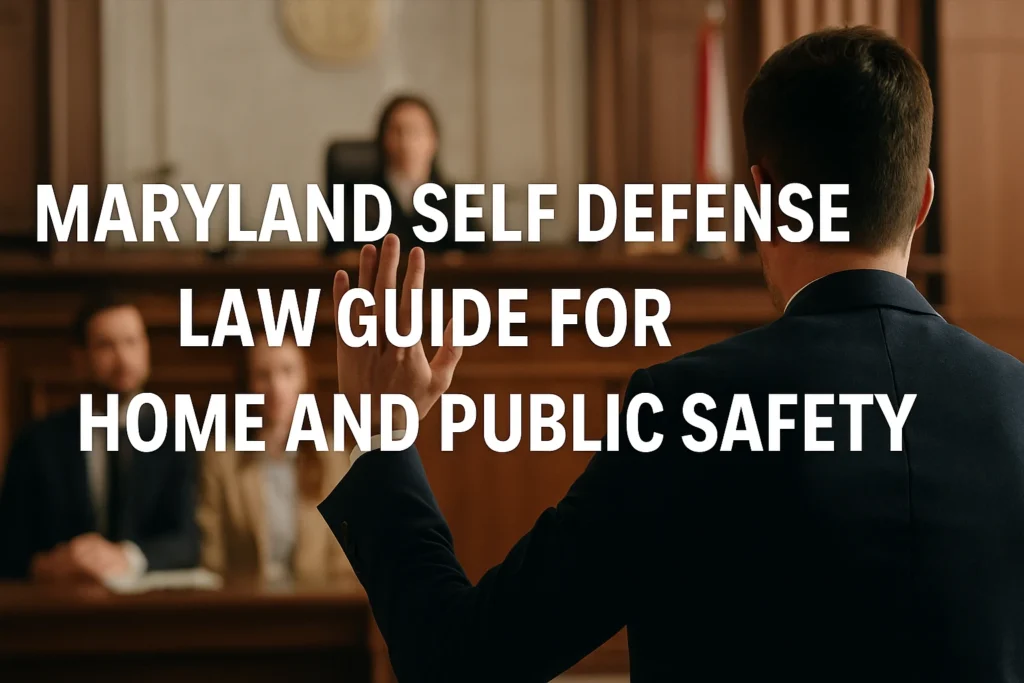Some charges carry more weight than others. Capital murder is one of them. This charge not only threatens freedom. It can also threaten life itself.
In many states, a capital murder conviction can lead to the death penalty or life without parole. That is why having the right lawyer makes a real difference.
Capital murder lawyers do more than fight a charge. They protect the accused from the harshest outcomes the legal system can offer.
These lawyers know the process. They understand the pressure. They defend people when everything is at stake.
This article explains who these lawyers are, what they do, and why their work matters.
What Capital Murder Means in Law
Capital murder is a form of first-degree murder. But it includes extra elements that raise the charge.
Killing a police officer, killing more than one person, or killing during another crime can turn murder into capital murder. Each state has its own rules, but the meaning is always serious.
This charge often leads to a high-profile trial. Prosecutors may seek the death penalty or life without parole. A conviction can take away every chance of freedom.
Because of this, the case must follow strict rules. The defense has the right to question all claims, all proof, and all steps in court.
Not every murder case becomes a capital case. The law adds this label only when certain facts exist. If someone kills during a robbery or targets a public servant, the law may treat the case more harshly.
These rules exist to show how the justice system views certain acts as worse than others.
The Role of a Capital Murder Lawyer
Capital murder lawyers handle cases where everything is on the line. Their role is complex, but it starts with one goal: to protect the life and rights of the accused.
They study every part of the case. They review police reports, evidence, witness statements, and court procedures.
These lawyers often begin work before charges are even filed. In many cases, police arrest someone and question them early.
A skilled lawyer steps in to stop unlawful questions, prevent false confessions, and demand fair treatment. From day one, the lawyer becomes the shield between the client and the system.
Once charges move forward, the lawyer begins a deep investigation. They hire experts. They test the state’s proof. They look for errors in the process.
A good lawyer knows how to spot weak points in the case. In a capital case, one mistake in court can change a life forever.
How Defense Strategy Works in These Cases
Defense in capital murder cases must follow a careful plan. The first goal is to avoid conviction. The second is to avoid a death sentence.
Sometimes both are possible. Sometimes, only one can be done. The lawyer must read the case clearly and act with purpose.
The strategy often starts with the facts. A defense team will ask questions like: Was the act planned? Was it in self-defense?
Is the accused the real person who acted? These answers shape the case. If doubt exists, the lawyer will use it to challenge the charge.
In some cases, the facts are strong against the accused. Then the goal shifts. The lawyer may not fight the charge. They may fight the sentence.
This is called the penalty phase. The defense can present facts about the person’s life, mental state, past trauma, or other issues. These facts can lead to a lesser punishment.
Jury Trials and Sentencing in Capital Cases
Most capital cases go before a jury. These jurors hear both sides. They listen to facts about the crime. If they say yes, the case moves to the next phase. That phase decides whether the sentence is life in prison or death.
Jurors must follow strict rules in capital cases. They must weigh facts carefully. The court tells them how to judge guilt and how to pick the right sentence.
A skilled lawyer speaks to jurors in clear terms. They explain what’s at stake. They ask them to see the full picture.
The sentencing phase can take days. Both sides present new facts. The state tries to show why the person should face death.
The defense gives reasons for mercy. The jury must agree. In some states, a single “no” vote from one juror can stop the death penalty. This makes strong jury work key for the defense.
Death Penalty Laws Across States
Not every state allows the death penalty. Some have banned it. Others still use it. Even in states with the death sentence, not every case ends that way. Courts and juries often choose life without parole instead.
Lawyers in death penalty states need special training. They must meet court rules. They must know how to handle both trial and penalty phases.
In some states, the court assigns lawyers from a special list. Only those with capital case skills can take on such cases.
The rules about who can face the death penalty are strict. The Supreme Court has said people with certain mental health issues cannot be put to death.
People under age 18 at the time of the crime also cannot face the death penalty. A good lawyer checks every rule to protect their client.
Investigators, Experts, and the Full Defense Team
Capital murder defense takes a full team. The lawyer leads, but others play key roles. Private investigators gather facts.
Forensic experts study evidence. Psychologists explain mental health. All of them help tell the full story.
The defense team must work fast. They must challenge the state’s claims at every step. A skilled team can prove doubt, show other causes, or bring up facts the state missed. In a capital case, no detail is too small to matter.
The lawyer also works closely with the client’s family. They gather records, childhood facts, school reports, and past struggles.
These details often come into play during sentencing. They can help paint a full picture of the person, not just the crime.
Plea Deals in Capital Murder Cases
Not all capital cases go to trial. Some end in a plea deal. The defense and the state agree on a sentence. In return, the person admits guilt. This avoids trial and removes the risk of a death sentence.
Plea deals are complex. The accused must agree freely. The lawyer must explain the full terms. A plea may mean life in prison.
Some view that as better than risking death. Others want to fight in court. The choice is personal.
A lawyer will explain both options. They will guide the client through risk and reward.
The final choice always belongs to the person charged. A skilled lawyer helps them choose with clear facts, not fear.
Public Defenders vs. Private Capital Defense
Not every person charged with capital murder can pay for a lawyer. Courts must provide a defense. Public defenders often take on these cases. Some states also appoint private lawyers and pay them with public funds.
Public defenders work hard. Many are experts in capital cases. But they face limits. Their time, staff, and tools may be stretched. That can make the job harder.
Private lawyers may have more freedom to hire experts, travel, and spend time on the case. But the cost can be high.
Not everyone can afford that. The best lawyer is one with skill, time, and care, no matter who pays them.
Real-Life Impact of a Capital Murder Lawyer
A good capital murder lawyer can change lives. They do more than argue in court. They protect the rights of people that the system may forget. They speak for the accused when others have judged them already.
Their work saves lives. They stop false charges. They prevent death sentences. They give hope to people who face the darkest days.
Their job is not easy. But their work matters more than most.
Many people fear lawyers or think they cost too much. In a capital case, a lawyer is not a luxury. It is a must. The law allows every person a fair defense. A capital murder lawyer makes sure that the right is real.
Bottom Lines
Capital murder is the most serious charge a person can face. It brings the full weight of the law. But even then, the law offers a defense.
A skilled capital murder lawyer stands in that place. They bring skill, care, and strength to a hard fight.
Not every lawyer can handle such cases. It takes more than law books. It takes heart, time, and steady nerves. The stakes are too high for guesswork or fear.
If you or someone you love faces this charge, act fast. Get help. Ask questions. Find a lawyer who knows how to fight the case the right way. It may save a life.
Disclaimer: This article shares general legal info. It does not give legal advice. Always speak with a licensed lawyer about your specific case.



